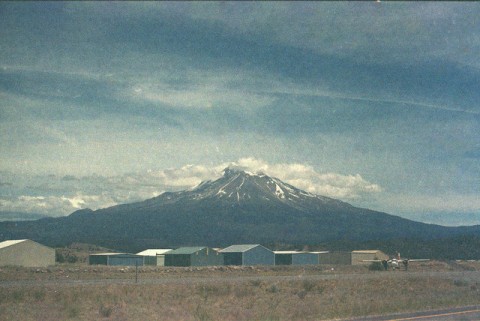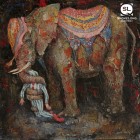It’s happening again, this bed. It’s happened many times. A ritual.
Across from this bed where you lie is a mirror. The back of your father’s flannel shirt and sun-starched bald spot hover over you; you can see his body in the reflection, but this isn’t what you’re looking for. You want the ceiling. Look at the ceiling.
Past the blur of his thinning, black hair, there’s a seeming infinity of mountains—just like the ones you learned about in social studies last year. This is what the popcorn-plastered ceiling has created—a series of miniature, swirling mountains—and there’s a movement to them. They sway, they duck, they bend, they dive, and you of all people know how to move; you of all people know how to sway and duck and bend and dive. You’re doing it right now. Something else: you imagine each little mountain as a signifier of the next—you don’t even imagine this; you’ve willed this—and there becomes an ineffable order to the uncertainty, some honey-sweet geometry in it all, in the little mountains on the ceiling. Your hand can almost reach the little mountains.
Above him, a rush of pipe water pours toward the kitchen where your mother is preparing lunch, and you’re brought back to this bed. The shift in weight begins a cascading line of creaks and cries. Another thrust churns by every ten seconds or so, the house sounding its protests. You tell yourself to wonder about its age—to wonder how this place that holds this room that holds you was ever born. You’ve lived in this house for as long as you’ve lived at all. Your father was raised here, you think, but there’s nothing beyond that. What could be beyond that? You try and trace the history of this very spot in reverse. There was a cleared lot; before that, a pine and sycamore forest. Everything preceding is a vague continuum of nomads and dinosaurs. You begin to consider this house as a page from a mystery book, a page somewhere in the middle—the only page not torn out completely.
Bed.
Think about your neighbor Mr. Jim Dale’s pool. You love that pool; many school-less afternoons have been occupied by its comforts. You can hear your friends swimming at Mr. Dale’s now—right now: sporadic splashing; the unintelligible, high-pitched howls and squawks of little stick-figure boys; the flutter of dripping-wet feet against cement. You love to sit on the bottom of that pool, chlorine burning your eyes as you watch the sunlight paint the walls like cantaloupe skin. You love to sit on the bottom, tongue-sketching the many-mountained popcorn ceiling from memory on the roof of your mouth. You love to sit on the bottom.
You love to let the air out of your lungs.



 The SmokeLong Grand Micro Contest (The Mikey) is now an annual competition celebrating and compensating the best micro fiction and nonfiction online.
The SmokeLong Grand Micro Contest (The Mikey) is now an annual competition celebrating and compensating the best micro fiction and nonfiction online.